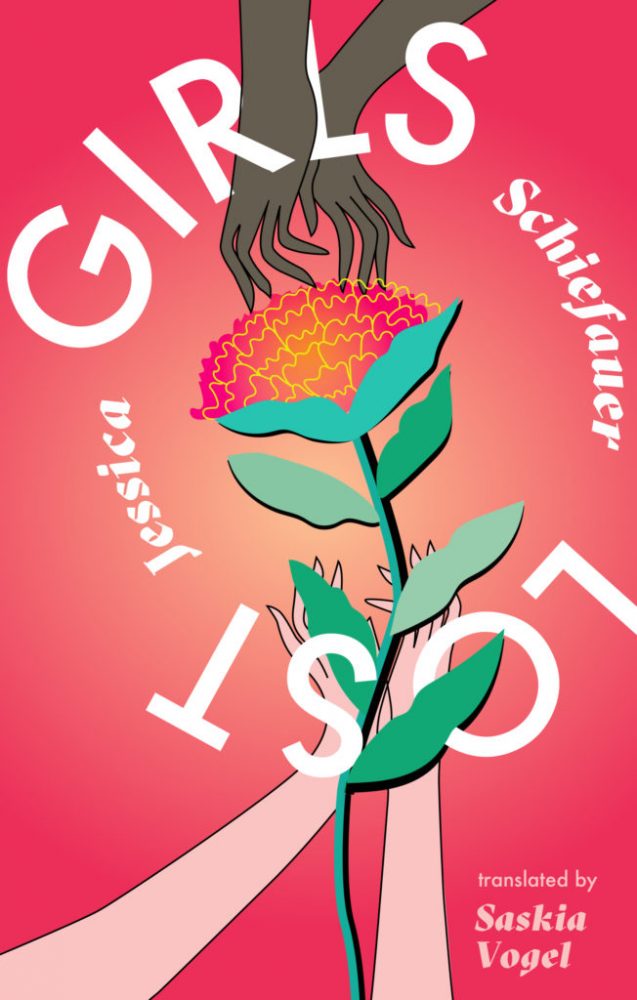Translated by the Swedish by Saskia Vogel
Body swap stories are a dime a dozen, from Freaky Friday to Your Name. But how about a story of three girls who discover the power to turn into boys for a short time?
Girls Lost is the tale of three teenagers, exhausted and confused by the system that divides boys and girls and the young men who abuse it, who find the chance to see, for a time, through the eyes of a man in a man’s world. At least, that’s how the book begins. Beyond that, Girls Lost escalates into a deep exploration of sexuality, primal urges, aggression, and the forms that freedom can take.

Girls Lost is a story in two acts: the first is a fairly surface-level excavation and shallow rummage through the things that divide men and women in the modern world. It’s an angry, thoughtful tale of misogyny, power plays, and abuse, all familiar themes and issues that are fought against on a daily basis. The second act, however, digs incredibly deep into a far more complex labyrinth of ideas and questions.
In its first instance, Girls Lost lays its cards on the table and makes it clear to the reader that this is a feminist story; it’s an angry tale of the abuse that women suffer, and the position of the woman versus the man in modern society.
Once that has been established, however, there is no more telling; no more scene setting. From its midpoint, Girls Lost is probing, prodding, asking questions, mulling, considering, debating. It doesn’t have an agenda; it’s a curious tale that simply wants us to consider the borders that have been built around sex, gender, and sexuality, and the politics and laws and rules and traditions and personalities that have been cultivated by these borders.
Kim, Bella, and Momo are three girls on the cusp of womanhood, still enjoying the imaginary worlds and stories they carved out as children. But boys have started to come along, throw their weight and their opinions around. They’re sexualising these girls, groping and abusing them, treating them like throwaway things.
Soon enough, a plant arrives at Bella’s greenhouse, the likes of which she has never seen. The girls discover that drinking the nectar of this flower provides them with the power to change into boys for a short time. And so, now they are girls by day and boys by night.
Labelled as “literary YA”, the book treats its young audience as mature and thoughtful adults, and it pulls no punches in its physical descriptions and its crass language. This is a book of brutality; a punk and angry novel, after all.
And so, we get that genital fascination and masturbatory intrigue that’s always glanced over or only alluded to in body-swap movies. And, beyond that, we get three girls in boy-bodies heading out to see how the world suddenly treats them differently.
Read More: A Day-Trip to Malmo, Sweden
As I said, this is a novel in two acts, with the first being a simple premise and scene setting with easy-to-follow themes of gender divides and hypocrisy. But before long, Kim, our narrator and true protagonist, becomes addicted to her boy-body.
And shortly after taking it for a test drive, she meets Tony. Tony is what us Brits would call a chav: an aggressive, violent, angry young man who smokes, drinks, steals, and bullies. Tony takes a liking to boy-body Kim and takes her in as a kind of sidekick. But it’s Kim’s quick and impassioned obsession with Tony that really elevates this novel from a clearly defined story, thematically and tonally speaking, to something far more complex and fascinating.
It’s difficult to discuss what is so complex and fascinating about Girls Lost in its second act without spoiling anything, but I will say that the questions and considerations it brings up are, in some ways, reminiscent of the recent “Striking Vipers” episode of Black Mirror.
And the way that the novel evolves into something so philosophically addictive and intriguing – with regards to gender and sexuality – while remaining a viscerally intense and poetically written novel, is a stroke of genius and a testament to how carefully and considerately Schiefauer has drawn out the lines of her story.
This intense narrative and poetic execution in Girls Lost is captured and expressed pitch-perfectly by Saskia Voel, the novel’s translator. Not every novel needs to be a page-turner; not every novel owes it to the reader to be gripping and engaging from page one, or even page 300; not every novel needs to, nor should be, built that way.
But Girls Lost is. From the book’s opening page, it is a fiercely gripping page-turner of a novel that you’ll easily find yourself finishing in a single sitting without ever meaning to, and before you’ve even realised you did it.
The frantic nature of the book’s narration, pacing, and language passes through the page and into your veins so seamlessly as to leave you with no choice but to feel every bit of pain, confusion, and frustration that Kim feels. Girls Lost is an empathetic novel that gets under your skin and has you gripping the pages, leaving them dented by finger marks, as you attempt to survive Kim’s life along with her.
The only minor failing of the novel is the inescapable and frustrating feeling that Bella and Momo are denied their own development; relegated to the role of supporting characters when they could have been as thoroughly detailed and explored as Kim is.
But, had that happened, then perhaps we couldn’t live as completely in the mind of Kim as we do. And this is all accomplished through such consistently phenomenal use of language and pacing that the novel effectively traps us in Kim’s mind and won’t let us out until the last page is turned.
Conclusion
Girls Lost has an exhausting amount of questions it wishes to ask, and considerations that it is eager to discuss about the walls between genders and sexualities, about the journey to womanhood and the relationships we build with our friends and lovers.
It’s a frightfully clever book with an ambitious philosophy that is entirely well-executed. It wants you to think, consider, and reconsider your position on sex, sexuality, and gender. And you will, over and over again, thanks to the empathy provided by Kim and the journey she takes.
Want more Swedish literature? Check out Faculty of Dreams and Welcome to America



